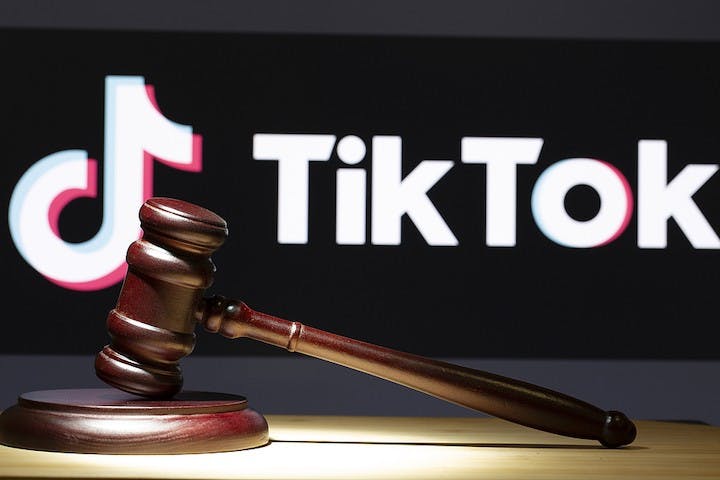It all started just a few weeks ago.
Brittany Pietsch – a relatively new joiner at web performance and security company, Cloudfare – had an inkling something was up.
A few other people had been laid off, and she guessed (correctly at it turned out), that her turn was imminent.
What happened next though, few could have predicted.
Deciding her fate was nigh, she set up her phone, trained it on herself looking at her computer screen, and filmed the ensuing – and painful – conversation (see below):
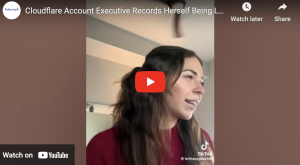
Her manager (who had only ever praised her performance), wasn’t even there, while the only people that were, were faceless higher management – including someone from HR, both of whom she’d never met.
The call was excruciating – not just because HR basically failed to give her a decent reason why she was being laid off. But worse than this however, was the fact that she then decided to post the video up for the world to see. Quickly she became an Internet sensation.
What’s new is creating a trend
As revenge tactics go – by garnering the group-think of social media to profoundly embarrass her employer – this is a pretty novel. To be fair, the company handled the call badly… but could they ever have expected this private exchange to go up for the rest of the world to see? Hardly.
And yet there they are, and the video has gained 3 million views and counting.
And like all things that capture attention on social media, it seems this one-off has started something of a trend, because it’s created a host of other employees now copying her tactic.
Take Utah-based creative professional, Mickella Simone Miller, who spotted a mysterious ‘catch up’ meeting with executives in her calendar. She also decided to document it, and likewise posted herself getting fired.
Miller and Pietsch join the likes of other TikTok’ers like ‘golden_pipes’ who recently posted a two-minute video of herself – apparently moments after being laid off – see below:
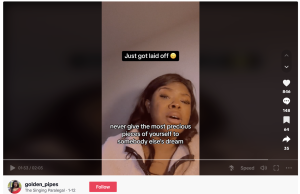
She berates her employers for sacking her – the only person who can use their systems – and ends her monologue telling others to “never give the most precious pieces of your life to someone else” – a telling hint if ever there was one that employers will never appreciate all the things someone will have given up for them.
These plus others now mean the TikTok hashtag #layoffs has garnered more than 366 million (and counting) views.
The end of trust
With many now applauding the actions of these aggrieved employees there is now a real chance more HR professionals could be on the back-foot, having seemingly private conversations broadcast for all to form an opinion on.
Not only is it a slap in the face, it really does signal the end of employee trust.
In moments like this though, the legal debate about someone publishing what is essentially intended to be a private call largely goes out of the window, because what matters most in the first instance is the PR backlash.
Technically, 11 states, including California, Delaware, Florida, Illinois, Maryland and Massachusetts, require “all-party consent” for recording, meaning everyone on the call must agree to be recorded.
However, this is unlikely to be foremost on company’s minds. Cloudfare’s boss was forced to explain the company’s decision to ‘rightsize’ the business, but only after significant backlash prompted it.
“When we’re doing performance management right, we can often tell within three months or less of a sales hire, even during the holidays, whether they’re going to be successful or not,” he was forced to explain (on X/Twitter).” He added: “Sadly, we don’t hire perfectly.”
What might be a surprise though, was that in (arguably saving his own skin), he took at pop at his own HR team:
“HR should be involved, but it shouldn’t be outsourced to them,” he said. “No employee should ever actually be surprised they weren’t performing. We don’t always get it right.” He also referenced the lack of kindness and humaneness that the video exposed.
Who’s right?
After the dust has settled, the obvious question around events like this is who’s right?
Is it the scorned employee, dishing out some cold, hard justice on the employer they hope will pay for this, or should one side with the company falling victim to a breach of faith in disseminating a private call?
According to Kyle Samuels, f CEO of
Of course, some employees might be filming their layoff so that the recording itself can be used as evidence that a layoff might be not be handled appropriately; that it is being done illegally, or to prove discrimination.
In other cases, employees are wising up to opening themselves up to any potential legal challenges by not filming themselves actually being fired, but filming their reaction to it afterwards, or reading out the exact communication they received about their fate – such as what Chloe Shih did, when she was laid off by Discord on 12th January. See below:
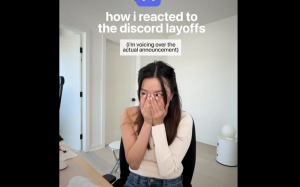
In Cloudfare’s case however, what arguably muddies the water is that many will point out that the company (and HR) was right to be embarrassed for conducting what was – by all accounts – a pretty shoddy lay-off call, without the right people there, and HR seemingly unable to explain why she was being let go.
As one respondent to her video messaged: “Companies do not care about you, so might as well put these people on the spot.”
Not just firings – other disputes are being videoed too
The problem for HR teams is that not only are their practices being put under the spotlight, it seems the trend is spreading beyond firing videos too.
Last week clothing brand Kyte Baby was also thrust into the media spotlight, when news circulated that employee Marissa Hughes had been let go.
The details are not entirely clear, but there are claims she wanted time off, or the ability to work flexibly when her adopted son was ill in hospital and the offer given to her (of two weeks) was rejected. After this, she was apparently let go, and Marissa set up a GoFundMe page to explain her plight.
What followed was the boss being forced to post a TikTok video of her own, apologizing.
But that wasn’t the end of it. After more than 2 million views, mostly sharing the opinion that her apology was forced an insincere, she was forced to go back onto the platform, and issue another – far more groveling, and wholehearted apology.
The bad news keeps on coming – the boycott backlash has also begun.
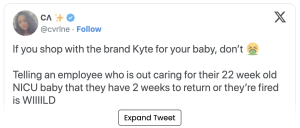
Supporting videos – one with more than 2 million views by one viewer says: “I will never give Kyte Baby another dime of my money, and I would encourage you to do the same… As someone who is adopted and a mom, this literally makes me sick.”
Another writes: “A business that has morals, ethics and supports their mothers is import to me. Instead [of] helping this family, they created more stress than necessary.”
Trial by TikTok?
So, is the latest worry to keep HR heads awake at nigh trial by TikTok? Must they now fear online backlash after every upsetting decision they make that might impact employees?
Samuels says: “My gut feel is that this is probably a temporary thing. I think employees will realize that maybe the juice isn’t worth the squeeze – that is, while posting a video might feel good in the moment, there may come the realization that doing so will not be good for their own future employment prospects.” He adds: “Companies doing their due diligence will see this, and might wonder if that’s the sort of person they may want to hire.”
However, he also says, that in the meantime, and before it dies down, this threat is still very real: “I think it does cast a spotlight on HR needing to do things humanely,” he says.
He continues: “There’s an element here – I think – of young people not realizing that firing is just business, and that often it’s not personal, and that while it might feel unfair, it’s perfectly legal and mostly done fairly.” But he adds: “This still means HR has to do things in such a way, that even if they are videoed, they can say they’ve done everything correctly.”
The trickier problem, is that if HR is caught out, and has to defend every bad moment, a bad precedent could be started.
But the trouble is, there is pressure too, to admit wrongdoing.
In Kyte Baby’s case, the CEO did admit that she was wrong, and that “having a little bit of sensitivity, understanding and flexibility would have accommodated her, and I did not accommodate her.”
Even here though, her response could be too little, too late, with the brand suffering huge reputational damage.
And while some have rallied round Kyte – suggesting they pursue Marissa for defamation, given Kyte acted without violating any employment law – pursuing this course of action might also land the company in bigger trouble. It’s not a good rap being seen to be going after someone with an ill child.
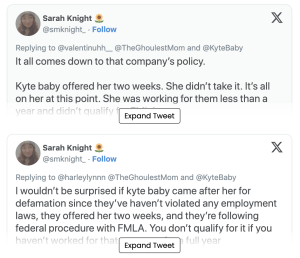
No-one’s a winner
It feels like that in cases like these, no-one really comes out a winner.
Employees are either chided for being petulant and narcissistic (and likely to be damaging their own future employment prospects, as firms will likely want to give these people a wide berth), or they’re praised as heroes.
Employers meanwhile, are thrust into the spotlight, and are either seen as being bad people, or unfortunate to have had their confidential conversations beamed out on the internet.
Samuels says: “Rather than HR worrying about how to stop this sort of activity, perhaps it should just be doing more to have more open communication with staff if the first place, because if they know what’s going on in the business, perhaps it won’t be so much of a surprise if there are layoffs.”
He adds: “Remote working has made things worse, because people are more disconnected anyway, do firms need to re-double their communication efforts.”
For the time being though, what’s certain however, is that HR folk definitely have to be more cautious – perhaps even asking/requesting at the start of any zoom-meeting firings that no recording devices are being used, and that written only transcripts can be asked for.
With layoffs likely to be a big feature for this year, HR has just got a brand new headache to deal with.
